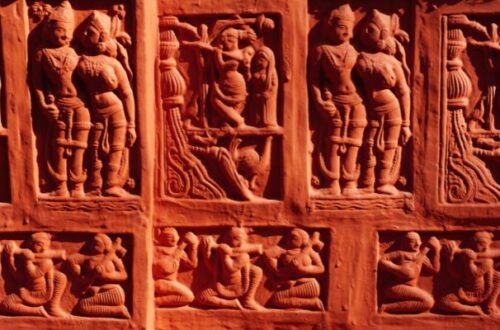
Spicing Things Up: 5 Tips for Writing Fictional Foods
When it comes to cultural worldbuilding in Sci-Fi and Fantasy, there are many things to consider: clothing, religion, holidays, languages, history, and so on. But, there is one very important element of culture that can immediately add a punch of flavour and life to your worldbuilding: food.
This is one of my favourite questions to ask myself when worldbuilding, and it’s one of my favourite details to see in the books I read. Since every culture in the real world has a distinctive flavour profile, adding this tasty detail to a fictional culture can bring an extra layer of complexity and interest to your worldbuilding.
So, whether it’s street food or a feast fit for kings, here are five tips for crafting the flavour profile of your fictional culture, and writing fantastic fictional foods.
1. What Resources Are Available?
This is the basis of every culture’s culinary feats. It can be easy to forget in our world of constant worldwide trade, but location is the first part of any culture’s flavour profile.
In a culture that exists on a coast or around a lake, some kind of seafood will likely be one of their staple foods. Hotter climates are better for growing various hot peppers, fruits, and spices, leading to bolder flavours. Is the culture on a trade route? There will probably be a larger selection of foods available, even though the imported food will likely be more expensive.
How do you figure out the resources available to a fantasy culture, though?
Well, look at equivalent cultures in our world and go from there.
Going for an island culture? Look at the cuisines of different island cultures around the world. Writing about people living in a frigid, ice-covered land? Look at the traditional cultures of people living in far northern regions, such as the far-northern areas of Canada and Russia. That kind of thing.
2. Are There Limitations to Food Based on Belief Systems?
Every culture has a belief system, core values that affect their way of life. In many cultures, this includes dietary restrictions. Whether it’s not eating certain animals out of a belief that they are either sacred or unclean, being vegetarian or vegan, preparing food in a certain way, or even holding certain parts of food in higher regard than others, it’s important to take cultural beliefs into account when writing a culture’s cuisine.
Is food prepared differently during feasts? Are there certain foods that only certain people are permitted to eat? Are some foods representative of the culture’s mythos? If so, then take them into consideration when crafting a cultural cuisine!
3. How Long Do People Go Without Fresh Food?
Is your culture nomadic? Do they have long, harsh winters that they need to endure?
In that case, they need food preservation techniques!
There are many to consider: pickling, jarring, drying, salting, fermentation and far more. Food preservation is extremely important for people who are expecting to go without for long stretches of time, and an important thing to remember about preserving food is that it changes the flavour, frequently making it stronger, especially since a lot of food preservation techniques involve a lot of spices. This will affect the flavour profile of the culture.
Bring magic or high-technology into the equation, and the options of food preservation are endless!
4. Is There Magic Involved?
Here’s an important addition to fantasy food: how much does magic have an effect on food?
Does magic help in the production of food? Does it affect crop growth and agriculture? Does it aid in the preservation process? Can it add additional effects? Can magic produce food? Does it affect trade?
All these things are vital to food production and use in any culture, and will affect the available resources for the culture’s flavour profile.
5. Are There Any Special Foods for Celebrations?
Every culture has its celebrations, and with celebrations come special foods.
What kind of foods do they eat on holidays? Are there any specific foods that are reserved or favoured for special occasions? Is there something specific only eaten at weddings or funerals? Fasts broken by great feasts?
Maybe they celebrate when a certain fruit is in season. Maybe they only eat a certain meat during a few weeks during a festival. Maybe there’s a special kind of fried food or dessert that everyone associates with a certain time of year.
Tradition and food are closely linked together, so consider what traditions and holidays are in your world’s culture, and how that might affect the regional food.
Overall
Those are my top five questions to ask when building a fictional culture’s cuisine! Food adds flavour in more ways than one, and understanding how food works within a culture can help to add that extra layer of depth to your world.
As an aside, I’ve personally found that watching and reading about food history has been incredibly useful as a resource! (I highly recommend Tasting History with Max Miller on YouTube as a particularly good resource for food history. Not only does he talk about the history around the food with a lot of detail, but he also cooks it and talks about the taste.)
If you’d like to read more tips on cultural worldbuilding, check out my post on it here!
Anyway, I hope you enjoyed the blog! Have a lovely day, and I’ll see you in the next one!
For writing updates and a peek behind the scenes, sign up for my newsletter here!





